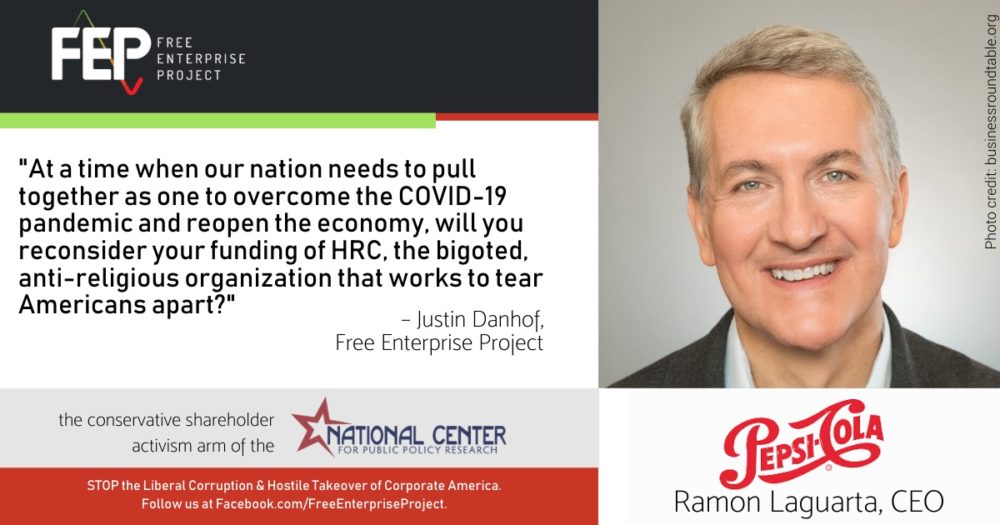LTP News Sharing:
PepsiCo.’s virtual shareholder meeting this morning further demonstrated both Pepsi’s bias and duplicity, and the problems that are engendered by virtual shareholder meetings under current U.S. Securities and Exchange Commission (SEC) rules.
We “attended” the shareholder meeting this morning, and submitted this question from Free Enterprise Project Director Justin Danhof, Esq.:
Pepsi is one of the leading sponsors of the Human Rights Campaign. HRC is perhaps the nation’s leading opponent of religious liberty. HRC threatens and organizes boycotts when states seek to enact laws protecting the right of people to act according to their faith or to use a bathroom in privacy that matches their DNA. HRC also works to dictate corporate philanthropy away from conservative and Christian organizations.
At a time when our nation needs to pull together as one to overcome the COVID-19 pandemic and reopen the economy, will you reconsider your funding of this bigoted, anti-religious organization that works to tear Americans apart?
Though the meeting lasted for slightly more than an hour, and CEO Ramon L. Laguarta answered about 20 questions in one form or other, he and the company just couldn’t find time to get to our question. At the end of the meeting the Pepsi spokesperson made a vague promise to answer all remaining questions on the company’s website (at some unspecified place) if those questions met the question-asking rules.
Earlier this afternoon we got this response via email, a non-answer that had clearly been run through the corporate-speak meaning-eviscerating machine to achieve the highest pretended loftiness with the lowest possible transmission of responsive information:
PepsiCo works with many groups on a wide range of issues, and we value a range of external perspectives for informing our policies and programs. We recognize that supporting diversity and inclusion is not only the right thing to do, it is the right thing to do for our business. This commitment is woven into our values and belief that our company is strongest when we embrace the full spectrum of humanity, regardless of what we look like, where we come from or who we love. That means both building a more diverse, more inclusive workplace, and promoting what we call courageous engagement in our company and the communities we serve. Additionally, PepsiCo is committed to respecting the human rights of all workers and local communities throughout our operations and value chain. As part of our approach, we are committed to implementing the UN Guiding Principles on Business and Human Rights.”
This is truly a state-of-the-art response. Even given (because of?) the extra hours the company gave itself to come up with a reply, the answer does not engage with our question at all. As we made perfectly clear, we weren’t asking about broad commitments to airy notions of inclusivity or civil rights by Pepsi, the HRC or anyone else. We asked specifically about HRC-sponsored efforts to force artists to create products in opposition of their beliefs (see, for example, the case of Masterpiece Cakeshop), and HRC demands for the abolition of single-sex bathrooms, locker rooms and the like. But since engaging with our actual question would have been hard, we were first ignored, and then fobbed off with high-toned but utterly irrelevant nonsense.
This belated, self-congratulatory but entirely non-responsive reply amplifies our concerns about both PepsiCo. and its support of HRC. PepsiCo wants the kudos for being on the HRC grace list, enjoying the reflected glory from a time when the HRC was at least broadly an organization that worked toward its own understanding of civil rights (whatever you might think about the individual policies it favored). But now Pepsi wants to continue to get the praise while refusing to recognize that the HRC has moved away from that position and into the role of campaigning to deny basic civil rights to anyone who dares to object to its ever-more-radical assertions about how the rest of us must conform our behavior to its increasingly outré worldview. And Pepsi wants credit for being an open and responsive company when in fact it is both manipulative and opaque — patting itself on the back for its civic-mindedness in the very act of being deceptive.
Pepsi’s performance today underscores the need for in-person shareholder meetings to resume as soon as the present pandemic reasonably permits, and for the SEC to establish more rigorous rules for virtual meetings in the interim. During this unique shareholder season, we have repeatedly seen company behavior designed to suppress or eliminate probing or critical shareholder questions – undoubtedly the most important questions in meetings, designed by law to allow shareholders to get honest and complete information about the companies in which they invest. Pepsi showed more of that behavior today. If virtual shareholder meetings are to continue for long – and especially if they are to become the norm – the SEC will have to step in to ensure that companies meaningfully answer all the questions put to them in shareholder meetings during the meetings. Allowing these companies to dodge the hard questions or to answer with evasions or empty corporate jargon, while allowing no opportunity for questioners to follow up, utterly defeats the purpose of the shareholder opportunity to put questions to corporate leaders.
From now on, then, make mine an iced tea. And definitely not a Pepsi brand.
Click on this graphic to support FEP’s efforts to move corporate America back to neutral.
The post Pepsi’s Connivances, and the Flaws of Virtual Shareholder Meetings, On Display Again Today appeared first on The National Center.
Author: Scott Shepard







